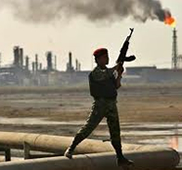Bodyguard Jobs On Oil Tankers
Although a single gallon of gasoline at the pump may only cost a consumer a few dollars, the cargo of a fully laden oil tanker is often worth many millions. Everyday oil tankers transport millions of tons of oil across oceans to destinations abroad. In fact, a single oil tanker can carry in excess of two million barrels (roughly 85 million gallons) of crude oil and petroleum product. With the current price of oil being an average of $80 per barrel, each oil tanker is capable of carrying approximately $160 million or more in product, so it is not surprising that these ships are a prime target for pirates and terrorists.
Oil Tanker Crew Size and Payload
The crew of an oil tanker is comparatively small considering the value of the cargo (with the average crew size being 25 crew members), and the ships are so large that many times the crew members use bicycles to ride from one end to the other. With such a small crew, high cargo payload, and only a single captain in many cases, having adequate security is imperative. In light of recent oil tanker hijackings, the availability of bodyguard jobs on oil tankers has increased significantly. The following information outlines the importance of such a profession and some of the duties and attributes required of an oil tanker bodyguard.
Duties of an Oil Tanker Bodyguard
As a bodyguard on an oil tanker the main objective is to keep the captain and crew members safe, while also securing the payload. Thus, the job may involve monitoring the surrounding waters for incoming ships, notifying the crew members of potential danger, handling and utilizing heavy artillery, communicating with nautical authorities, and keeping peace amongst the crew members. There are two main types of bodyguards that work on oil tankers – those that protect specific crew members such as the captain, and those that work with a team of guards in unison to protect the entire ship. Although the aforementioned tasks may seem intimidating, it is important to note that in 99 percent of cases, bodyguard jobs on oil tankers involve nothing more than enjoying the fresh air of the ocean.
The Increased Demand for Oil Tanker Bodyguards
The recent shift towards a heightened consciousness regarding the safety of oil tankers and their crew members began in November of 2008, when pirates hijacked a supertanker off the coast of Africa carrying 2 million barrels of oil. Other similar attacks occurred throughout 2009, particularly in the infamous Gulf of Aden region, leading many oil companies to improve high seas security by hiring protective teams and creating new bodyguard jobs on oil tankers. However, the bodyguards are certainly not alone in protecting these massive ships, as the Naval presence in high risk areas has also been increased by various governments around the world. While the job description may conjure up images of Steven Seagal in the movie 'Under Siege', the occupation is relatively safe in comparison to other oceanic jobs like crab fishing and deep sea diving.
